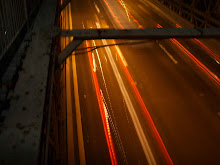I spend my evenings - six days a week - at work at a newspaper, labouring lovingly over news copy that, I am acutely aware, will only be served cold with someone's morning coffee.
Considerable time and effort goes into making a newspaper. A bunch of reporters, photographers, sub editors and editors are working odd and/or long hours, following a tradition of news gathering and dissemination fine-tuned over decades, as a regal masthead never fails to point out.
All that work for nothing.
The said masthead has only borne witness to a news cycle that only gets shorter. And Thursday's story with Wednesday's data that I painstakingly corrected and placed in prime position on what will be Friday's newspaper, just so you can read it on Friday evening after work, is then just a jaded retelling of something you already saw on the tele or your RSS feed.
So, it is exceedingly heartening - I thanked the lord and everything - that a major newspaper breaks this floundering tradition with a clarification of what a print-based news organisation can do to turn its fortunes around.
When The Guardian gets ready to "double digital revenues" and "spend 80% of its focus on digital", I am hopeful that it is an example of how newspapers can break the "breaking news" cycle to put the emphasis back on good journalism, without the "deadline" excuse for shoddy reporting. Or for rehashed press releases.
From editor-in-chief Alan Rusbridger:
Nothing tells a story like words and pictures. Whether on 20 sheets of paper delivered at your doorstep or via scrollable text at the click of a mouse. Surely it is common sense for print to converge with online/ digital journalism?
Considerable time and effort goes into making a newspaper. A bunch of reporters, photographers, sub editors and editors are working odd and/or long hours, following a tradition of news gathering and dissemination fine-tuned over decades, as a regal masthead never fails to point out.
All that work for nothing.
The said masthead has only borne witness to a news cycle that only gets shorter. And Thursday's story with Wednesday's data that I painstakingly corrected and placed in prime position on what will be Friday's newspaper, just so you can read it on Friday evening after work, is then just a jaded retelling of something you already saw on the tele or your RSS feed.
So, it is exceedingly heartening - I thanked the lord and everything - that a major newspaper breaks this floundering tradition with a clarification of what a print-based news organisation can do to turn its fortunes around.
When The Guardian gets ready to "double digital revenues" and "spend 80% of its focus on digital", I am hopeful that it is an example of how newspapers can break the "breaking news" cycle to put the emphasis back on good journalism, without the "deadline" excuse for shoddy reporting. Or for rehashed press releases.
From editor-in-chief Alan Rusbridger:
Every newspaper is on a journey into some kind of digital future. That doesn't mean getting out of print, but it does require a greater focus of attention, imagination and resource on the various forms that digital future is likely to take.The article continues:
Based on research that showed that half of readers read the newspaper in the evening, the aim was to create a title that would be "as relevant at 9am as 9pm". It would focus less on breaking news and instead aim to emulate "Newsnight not News at Ten".Seems obvious for any newspaper, no?
Nothing tells a story like words and pictures. Whether on 20 sheets of paper delivered at your doorstep or via scrollable text at the click of a mouse. Surely it is common sense for print to converge with online/ digital journalism?





3 comments:
and I enjoyed the links too :)
Filter coffee & scrolling text....no way!!
Dada, there's a suggestion that most people will soon read the newspapers in the evening or at the end of the day, not in the morning.
During the day, your news will be delivered to you, as and when it happens, either through mobile, or computers.
While, in the future, there may still be those who read the paper in the morning, it won't be "news",that they read, but possibly (and in my opinion, preferably) more commentary or analysis.
Post a Comment